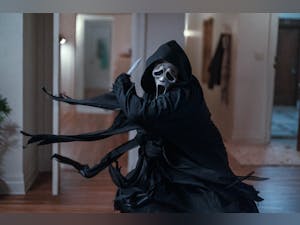From: Silver Screen
Grim and mystifying, ‘French Exit’ is a riddle of a film

Driven by its macabre makeup and general gloominess, “French Exit” is an aesthetic feast for those that revel in peculiar, suspenseful films.
Visibly drawing from the style of famed filmmaker Wes Anderson, director Azazel Jacobs produces a well-built world within “French Exit.” The screenplay — penned by Patrick deWitt, who wrote a novel of the same name — relies heavily on the art of confusion, the pleasure of shock and the expectation that the audience can predict little of what is next to come.
The film’s value would probably be less substantial without the exceptional work of Michelle Pfeiffer, whose unsettling performance as Frances Price forcefully depicts the unravelling of a once-socialite as she collapses at the hands of her insolvency. Pfeiffer embodies the full range of her abilities, switching from tenderness to recklessness in a matter of seconds. Running from a precarious fate, Price and her son, Malcolm (Lucas Hedges), relocate to Paris and find themselves meddling with the supernatural while reconciling their relationship with one another.
Frances’ emotional undoing competes for screentime with the romantic pursuits of Malcolm, who finds himself entangled with a clairvoyant, Madeleine (Danielle Macdonald) while keeping tabs on a sweetheart from home, Susan (Imogen Poots). Hedges' performance is intriguing, if a bit underwhelming, though his romantic moments with Poots are heartfelt and, to some extent, uplifting.
The film reads more like a stage play than a collection of moments, with scenes fluidly tied together by the ominous movements of a black cat — a cat that may or may not be Frances’ dead husband. Shots live in an earth-toned palette, deviating very little in mood from location to location. Once the film shifts to a rather rainy Paris, the cinematography relies heavily on undersaturated shots of the alleyways of the city to remain compelling.
With the exception of Pfeiffer and Hedges, no actors in this film make that great of an impact. They all play into the cohesiveness of the ensemble cast, though the structure of the film doesn’t allow much of a chance for standout performances. Perhaps not a fault of the actors themselves, it can sometimes be challenging to follow the motives of each of the characters, as most of their actions seem not to be bound together by any clear purpose.
Other than Pfeiffer’s performance, the film’s strongest aspect is the score, which marks a brilliant entrance onto the scene for newcomer composer Nicholas deWitt. The film also benefits from the eye-catching costuming designed by Jane Petrie. The visual and auditory experiences of the movie make up for the occasional lack of effective plot explanation.
While perhaps not the most riveting film of the 21st century, “French Exit” is an enthralling experience for any who consider themselves fans of ornamental, puzzling dramas.
French Exit will be released in theaters nationwide on April 2.




